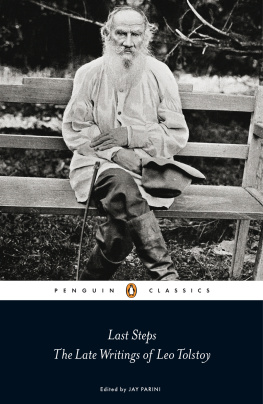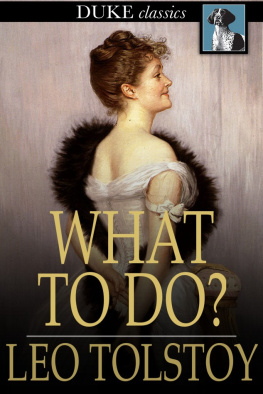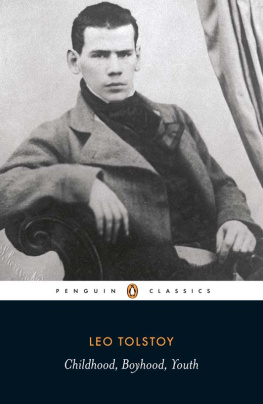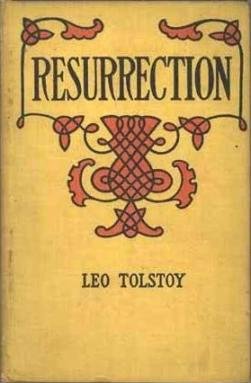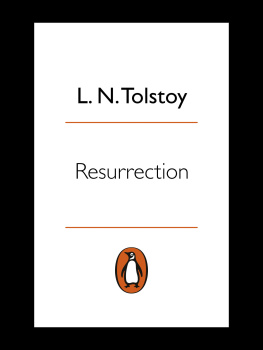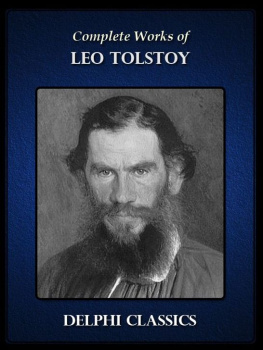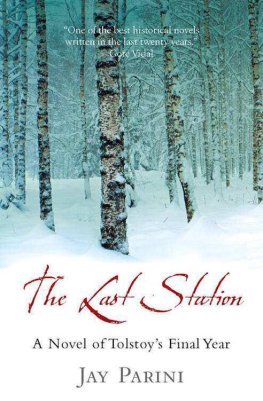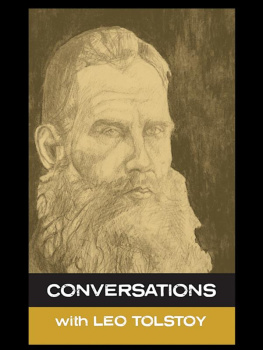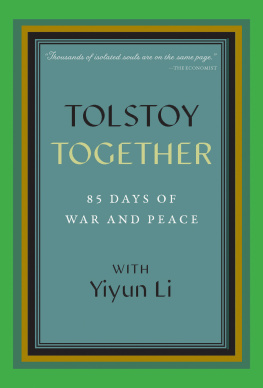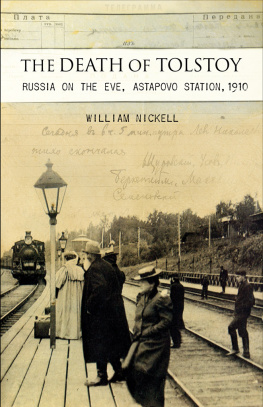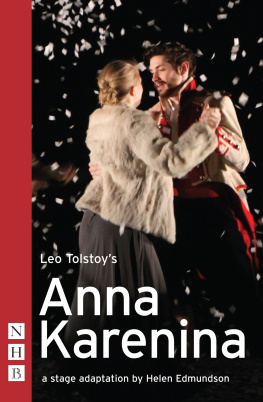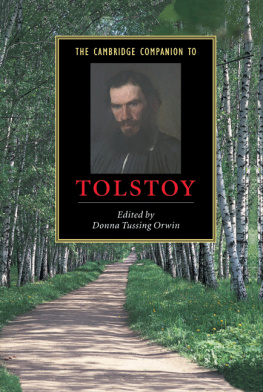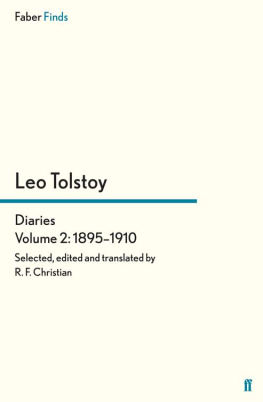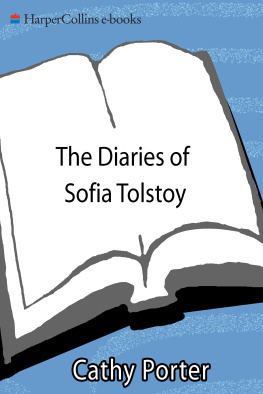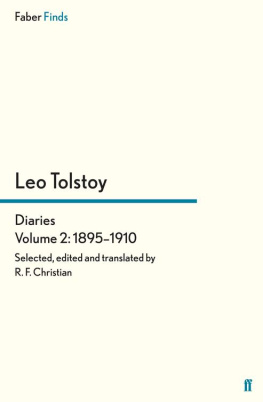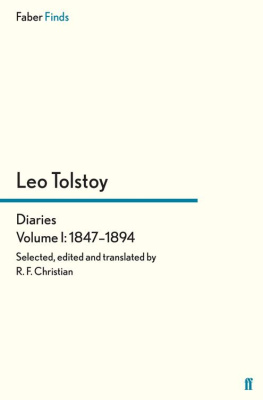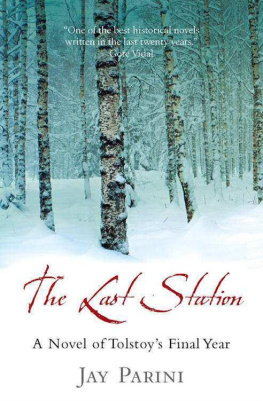LEO TOLSTOY
Last Steps
The Late Writings
of Leo Tolstoy
Edited with an Introduction by JAY PARIN
Translations by R. F. CHRISTIAN, CONSTANCE GARNETT,
MICHAEL R. KATZ, JANE KENTISH, AYLMER MAUDE,
JAY PARINI and LEO WIENER
PENGUIN BOOKS
PENGUIN CLASSICS
Published by the Penguin Group
Penguin Books Ltd, 80 Strand, London WC2R 0RL , England
Penguin Group (USA) Inc., 375 Hudson Street, New York, New York 10014, USA
Penguin Group (Canada), 90 Eglinton Avenue East, Suite 700, Toronto, Ontario, Canada M4P 2Y3
(a division of Pearson Penguin Canada Inc.)
Penguin Ireland, 25 St Stephens Green, Dublin 2, Ireland
(a division of Penguin Books Ltd)
Penguin Group (Australia), 250 Camberwell Road, Camberwell, Victoria 3124, Australia
(a division of Pearson Australia Group Pty Ltd)
Penguin Books India Pvt Ltd, 11 Community Centre, Panchsheel Park, New Delhi 110 017, India
Penguin Group (NZ), 67 Apollo Drive, Rosedale, North Shore 0632, New Zealand
(a division of Pearson New Zealand Ltd)
Penguin Books (South Africa) (Pty) Ltd, 24 Sturdee Avenue, Rosebank, Johannesburg 2196, South Africa
Penguin Books Ltd, Registered Offices: 80 Strand, London WC2R 0RL , England
www.penguin.com
This selection first published in Penguin Classics 2009
Selection and editorial material Jay Parini, Translation of Alyosha Gorshok Michael R. Katz, 2009
Translation of The Law of Love and the Law of Violence Jane Kentish, 1987
Translation of Tolstoys Letters R. F. Christian, 1978
Translation of Tolstoys Diaries R. F. Christian, 1985
All rights reserved
The moral right of the translators and editor has been asserted
Except in the United States of America, this book is sold subject
to the condition that it shall not, by way of trade or otherwise, be lent,
re-sold, hired out, or otherwise circulated without the publishers
prior consent in any form of binding or cover other than that in
which it is published and without a similar condition including this
condition being imposed on the subsequent purchaser
ISBN: 978-0-14-195954-2
LAST STEPS THE LATE WRITINGS OF LEO TOLSTOY
COUNT LEO TOLSTOY was born in 1828. He took part in the Crimean War, and married Sofya Andreyevna Behrs in 1862. Over the next fifteen years they had thirteen children and Tolstoy managed his vast estates in the Volga Steppes, continued his educational projects, cared for his peasants and wrote War and Peace (1869) and Anna Karenina (1877). A Confession (1882) marked a spiritual crisis in his life; he became an extreme moralist and in a series of pamphlets after 1880 expressed his rejection of State and Church, indictment of the weaknesses of the flesh and denunciation of private property. In 1901 he was excommunicated by the Russian Holy Synod. He died in 1910, in the course of a dramatic flight from home, at the small railway station of Astapovo.
JAY PARINI , a poet and novelist, is Axinn Professor of English at Middlebury College in Vermont. His books include The Art of Subtraction: New and Selected Poems (2005) and The Last Station (1990), a novel of Tolstoys last year. He has also written biographies of John Steinbeck, Robert Frost and William Faulkner.
Chronology
1724 Pyotr Tolstoy (great-great-great-grandfather) given hereditary title of Count by Tsar Peter the Great
1821 Death of Prince Nikolay Volkonsky, Tolstoys grandfather, at Yasnaya Polyana, Tula Province, 130 miles southwest of Moscow
1822 Marriage of Count Nikolay Tolstoy and Princess Marya Volkonskaya
1828 28 August (Old Style). Birth of fourth son, Leo Nikolayevich Tolstoy, at Yasnaya Polyana
1830 Death of mother
1832 The eldest, Nikolay, informs his brothers that the secret of earthly happiness is inscribed on a green stick, buried at Yasnaya Polyana (Tolstoy later buried there)
1836 Nikolay Gogols The Government Inspector
1837 Death of Alexander Pushkin in duel
Death of father
1840 Mikhail Lermontovs A Hero of Our Time
1841 Death of Lermontov in duel
Death of first guardian Alexandra Osten-Saken, an aunt. The Tolstoy children move to Kazan to live with another aunt, Pelageya Yushkova
1842 Gogols Dead Souls
1844 Enters Kazan University, reads Oriental languages
1845 Transfers to Law after failing examinations. Dissolute lifestyle: drinking, visits to prostitutes
1846 Fyodor Dostoyevskys Poor Folk
1847 Inherits estate of Yasnaya Polyana. Recovering from gonorrhoea, draws up scheme for self-perfection. Leaves university without completing studies on grounds of ill health and domestic circumstances
184850 In Moscow and St Petersburg, debauchery and gambling, large debts. Studies music
1850 Ivan Turgenevs A Month in the Country
1851 Travels to the Caucasus with Nikolay, who is serving in the army there. Reads Laurence Sterne: starts translating his Sentimental Journey (not completed). Writes A History of Yesterday (unfinished, first evidence of his powers of psychological analysis). Begins writing Childhood
1852 Death of Gogol. Turgenevs Sketches from a Hunters Album
Enters the army as a cadet ( Junker); based mainly in the Cossack station of Starogladkovskaya. Sees action against the Chechens, and narrowly escapes capture
Childhood
1853 Turkey declares war on Russia
The Raid
1854 France and England declare war on Russia. Crimean War starts
Commissioned, serves on Danube front. November: transferred at own request to Sevastopol, then under siege by allied forces
Boyhood
1855 Death of Nicholas I; accession of Alexander II
In action until the fall of Sevastopol in August. Gains celebrity with Sevastopol in December and further sketches, Sevastopol in May, Sevastopol in August 1855 (1856), Memoirs of a Billiard Marker, The Woodfelling
1856 Peace signed between Russia, Turkey, France and England
Turgenevs Rudin
In St Petersburg, moves in literary circles; associates with Turgenev, Ivan Goncharov, Nikolay Nekrasov, Afanasy Fet and others. Leaves the army. Death of brother Dmitry
The Snowstorm, Two Hussars, A Landowners Morning
1857 FebruaryAugust. First trip abroad, to Paris (lasting impression of witnessing an execution by guillotine), Geneva and Baden-Baden
Youth, Lucerne
1858 Long-term relationship with peasant woman on estate, Aksinya Bazykina, begins
Albert
1859 Goncharovs Oblomov; Turgenevs The Home of the Gentry
Founds primary school at Yasnaya Polyana
Three Deaths, Family Happiness
1860 Death of his brother Nikolay from tuberculosis
Dostoyevskys Notes from the House of the Dead (186061). Turgenevs On the Eve
186061 Emancipation of serfs (1861). Other reforms follow: Elective District Councils (zemstvos) set up (1864); judicial reform (1865). Formation of revolutionary Land and Liberty movement. Commencement of intensive industrialization; spread of railways
Serves as Arbiter of the Peace, dealing with post-Emancipation land settlements. Quarrels with Turgenev and challenges him (no duel). Travels in France, Germany, Italy and England. Loses great deal of money through gambling. Meets Proudhon in Brussels
1862 Turgenevs Fathers and Sons
Starts a magazine at Yasnaya Polyana on education for the peasants; abandoned after less than a year. Police raid on Yasnaya Polyana. Considers emigrating to England and writes protest to the Tsar. Marries Sofya Andreyevna Behrs (b. 1844)

